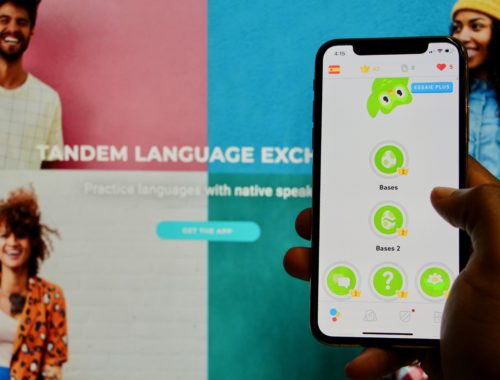
You’ll Never Be Native: Hard Truths About Language Learning
As two anglophones who spent years acquiring French as our second language, taught English in French public schools, and earned master’s degrees from a French university, we know a thing or two about language learning! The language-learning community on Twitter is known for fostering interesting conversations about the ins and outs of studying foreign languages. Sometimes, however, the 280-character limit just isn’t enough space to fully express an idea! When we ran across this tweet, we knew we had to respond with a long-form article.
What are some hard truths about language learning?
— Language Learning Hub (@LangLearnHub) June 25, 2022
Though on the surface it seems obvious, one difficult-to-accept truth for many language learners is that no matter how many years you study, how much effort you exert, or how much you love your target language, you’ll never be a native speaker. Keep reading to find out why this hard truth matters and how to deal with it as a language learner.
You may never completely finish studying.
Learning every word and phrase in a language is an impossible task. Given that we don’t even have exhaustive knowledge of our own native languages, it only makes sense that perfect mastery of a target language is similarly out of reach. Therefore, language learning journeys don’t really have a finish line – there is always more to learn.
Nonetheless, it’s tempting for language learners to fantasize about the day when they will be so fluent that studying becomes obsolete. We hate to be the bearers of bad news, but this day will realistically never come. Successfully moving up in the ranks of language proficiency from A1 all the way to C2 is a massive accomplishment, but even a C2-level speaker doesn’t know everything about the language.
If you’re looking to become proficient in a language, it’s important to conceptualize the process as an ongoing quest of continued improvement, rather than a short-term sprint to mastery.
You may never fully lose your accent.
Many language learners view getting rid of their foreign accent as an essential part of mastering their target language. Working on skills like pacing, pronunciation, fluidity, intonation, and syllable stress will bring you closer to native-level speech. Nevertheless, it’s usually possible to detect a foreign accent, even in the cases of language learners who have nearly perfected their diction.
This fact doesn’t stop many language learners from fervently trying to erase their accent in hopes of sounding like a native speaker. However, when you go to great lengths to refine your accent, only for a single slip up to reveal your non-native status, it can feel discouraging!
Accepting that your foreign accent may continue to peek through from time to time will allow you to focus your efforts on increasing your intelligibility. The ability to make yourself understood in your target language is what matters most!
You may never entirely fit in.
If you’re spending time in a country where your target language is spoken, your language expertise will certainly help you acclimate. You may think that impeccable linguistic competence is the key to going about your routine incognito as a foreigner abroad. Yet, language proficiency is only part of the equation.
Years of studying a language and culture will never amount to growing up and living like a native, and you’ll very likely always be seen as a foreigner. Just as a French person can imagine attending an American high school’s homecoming football game, you can conceptualize preparing for and taking the infamous French baccalaureate exam. Even so, conversations about topics like these will make you stick out like a sore thumb, no matter how well you speak the language.
If the end goal of your language journey is to pass for a native, you’re setting yourself up for disappointment. Instead, you should aim to speak and understand well enough to participate in enriching cultural exchange.
Truth be told, aspiring to be just like a native speaker is a pipe dream that only serves to distract from the true joys of language learning. The sooner you learn to embrace your non-native speaker status, the sweeter your language-learning journey will become! Do you struggle with never-ending studying, wishing your accent would completely disappear, or trying to blend in with natives? Let us know in a comment!
Improve your French easily by watching this video!
You May Also Like

Practical Tips For Maintaining Your French-Language Fluency Level
August 12, 2020
Is the DALF C2 Really that Difficult?
June 1, 2022


2 Comments
ProfP
hi, Had to comment on this one – it’s SOOOOO true! I spent my junior year of college in Paris, and many of us were obsessed with trying to “pass” as French. Changed my hair cut. Couldn’t really afford new clothes, but modified how I wore them. I was fortunate to have a high level of fluency already, and certainly tried hard to improve. By the time I was a post-doc in France (following a PhD unrelated to France or French), I realized this was a silly goal. There was nothing wrong with being who I am. Yes, improving your linguistic skills is worthwhile because you get more out of life in France if you understand more and participate more. So I continue to try, but even now, I’m told I have “un petit accent.” And I’ve finally decided to live with it. Lose an L1 accent completely is extremely rare.
Jalen & Maria
Thanks so much for sharing your experience! We’re glad the article resonated with you.